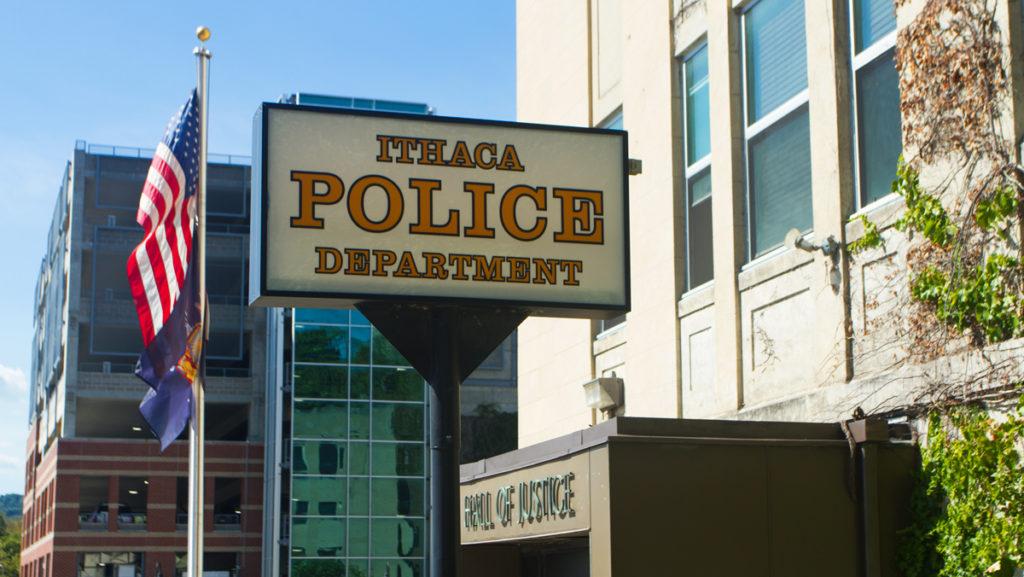The proposed plans for public safety reform in Ithaca are receiving mixed reactions from the Ithaca community.
Ithaca’s “Reimagining Public Safety Collaborative” initiative was created following an executive order from New York Gov. Andrew Cuomo, which requires all municipalities with police departments to adopt a plan for police reform by April 1. Through the months of November and December 2020, the City of Ithaca hosted weekly public forums over Zoom in which community members voiced their opinions. In January, the collaborative prepared its findings and recommendations.
Ithaca City and Tompkins County officials and officials from the Center of Policing Equity (CPE) released the 98-page reimagining draft to the public Feb. 22. The draft includes 19 recommendations, including replacing the City of Ithaca Police Department (IPD) with a “Community Solutions and Public Safety Department” that will include “armed, uniformed first responders called Community Safety Officers” and “unarmed first responders called Community Solutions Officers.”
There are currently 63 funded sworn officer positions in IPD. There is one chief and two deputy chiefs. There are four lieutenants and nine sergeants. There are also eight civilian employees and 16 part-time school crossing guards included in the 2021 IPD budget, according to the draft. The draft does not include the proposed number of armed and unarmed officers that the new department would have.
The draft also proposes establishing a pilot program for non-emergency calls, collecting and evaluating data based on the results of officer-initiated traffic stops, transferring ownership of the SWAT mobile command vehicle to the Tompkins County Department of Emergency Response, creating a “Tompkins County Public Safety Review Board” and evaluating “existing models and implement an alternative to law enforcement response system for crisis intervention and wraparound health and human services delivery.”
The draft does not include any recommendations related to Ithaca College’s public safety department or Cornell University Police. Ithaca College is not located in the City of Ithaca.
At a press conference Feb. 22, Molino and Ithaca Mayor Svante Myrick emphasized that the draft was just the beginning of the process.
Tracie Keesee, Co-founder of CPE, said the recommendations were not embraced by the entire community. She noted the historical mistrust many people, especially people of color, have in issues surrounding policing.
“I want folks to understand [that] although we created a process we felt, for the time period that we had, that we could reach out to folks and to get that information,” Keesee said. “But I would have to be remiss if I didn’t mention the fact that we have some folks that just did not trust in this process and that’s okay, because that’s meeting people where they live and where they are.”
The draft was mentioned in an article about Myrick that was published in GQ on Feb. 22, prior to the public release of the draft. The draft was presented to the Ithaca City Common Council on Feb. 22 and was met with mixed reviews.
At the Common Council meeting, IPD Chief Dennis Nayor said he was frustrated with how officers in the department learned about the draft from the article first, rather than from himself or city officials.
“They just feel so dejected and devalued,” Nayor said. “Now, knowing that their jobs are in jeopardy, it’s the reality of it. They are the key stakeholders that can allow this to be successful.”
Myrick later apologized to the IPD and Common Council for the timing of the article. He also issued an apology at the public forum Feb. 25.
Some Common Council members expressed concern about the budgetary impact of the recommendations.
“I recognize you can’t put dollar amounts against every one of these ideas at the moment,” said Rob Gearhart, 3rd Ward Alderperson and associate dean for the Roy. H Park School of Communications. “But the sooner we can understand the scope of what we are hoping for and what impact that has on our budget, and how things might not be able to be funded and what impact that has on the plan, that will be really important.”
The Ithaca Police Benevolent Association (IPBA), the IPD union, strongly objected to the proposed recommendations. At a press conference Feb. 26, IPBA president Thomas Condzella encouraged Common Council members to reject the draft.
“We remain open to change, we are open to reform, but the Ithaca PBA will not stand for bully tactics, underhanded politics and union busting, and nor should any other labor organization,” Condzella said in a public statement released by the IPBA.
In February and March, the public will be able to comment on the proposed changes, though the city is under no requirement to implement any suggestions. After this public comment period, those involved with the initiative will finalize and adopt plans to be submitted to the state by April 1.
Approximately 156 community members attended a virtual public forum Feb. 25 in which the draft was also met with primarily negative reactions.
Community members asked how the recommendations would hold police officers accountable, expressed concern about how the recommendations would impact ongoing mental health work and wanted clarification on the difference between the IPD and the “Community Solutions and Public Safety Department.”
Myrick said the recommendations would not rebrand the IPD but instead design a new department.
Some community members also criticized Myrick for sending mixed messages about his opinion on the IPD, noting specific incidents that have occured over the past 10 years in Ithaca.
There were ongoing protests against police brutality and racism in Ithaca throughout 2020, specifically aimed at incidents involving the IPD.
Shawn Greenwood, a Black Ithaca resident, was killed by Ithaca police officer Bryan Bangs Feb. 23, 2010. Bangs was cleared of any wrongdoing in July 2010.
The IPD faced criticism for its handling of an incident on The Commons involving Cadji Ferguson and Rose DeGroat, two Black Ithaca residents, in 2019. DeGroat was initially charged with felony second-degree attempted assault, resisting arrest and obstructing governmental administration, but her charges were later dismissed. Ferguson was found not guilty of disorderly conduct.
In October 2020, Vincent Monticello, IPD Deputy Chief, defended a man who told a Black protester to “Just die, go kill yourself.” Monticello then proceeded to arrest the Black protester for “obstruction.” The Community Police Board cleared Monticello of wrongdoing in January.
After this, there was a petition on Change.org calling for Monticello to step down, which received over 1,500 signatures.
In January, IPD officer Kevin Slattery was suspended for 30 days and demoted as a result of body-camera footage in which he bragged about beating up a suspect.
Some community members at the college have also had negative interactions with the IPD. In 2016, Kyle Goldstein ’18 was allegedly detained and arrested by Ithaca police officers. Goldstein suffered permanent eye damage as a result of being pepper sprayed.
As of January, Nayor announced his resignation, set for April or May.
Three professors at the college, Paula Ioanide, professor in the Center for the Study of Culture, Race and Ethnicity (CSCRE); Belisa Gonzalez, associate professor and director of CSCRE; and Sean Eversley Bradwell, assistant professor in the Department of Education, have been working with the reimagining initiative.
There are five working groups that tackle different parts of the reform movement: a leadership administration/budget group, an IT/data analysis group, an academic/research group, a communications/community group and a law enforcement/public safety group.
Ioanide is a part of the IT/data analysis group. Gonzalez and Bradwell are both part of the academic/research group and the communications/community group. Gonzalez and Bradwell declined to be interviewed until after the reform plans are submitted April 1.
Jason Molino, Tompkins County administrator, headed the collaborative and said he wanted faculty members involved to bring an additional perspective to the table.
“They’re members of the community, they have a level of expertise, … and that’s an important piece as we go through this and assess the information and look at solutions,” he said.
Ioanide said she thought the community engagement aspect of the collaboration was extensive, but it is unclear whether the community input in the collaboration will result in actual concrete policy changes.
“Partially why I wanted to get involved was to make sure the community input is well-represented and not misappropriated to do something else,” Ioanide said.
Over the past few months, Park Scholars at the college partnered with WRFI Community Radio and the Ithaca Voice to create a five-part radio and podcast series titled “Which Way Forward,” which explored solutions to address policing and public safety through interviews with city officials and community members. The series aired from Feb. 1 to 5.
Senior Skylar Eagle worked on “Which Way Forward” and said the goal of the project was to build on existing discussions around police reform and encourage more communication on the local level. The series looked at alternatives to policing, community responses to police brutality in Ithaca and grassroots organizations that are working for equitable public safety.
“We kind of collectively decided that this was something that we needed to cover, especially since these conversations were starting to happen locally and all of these protests were happening weekly,” she said.
A part two of “Which Way Forward” is currently in the works and will air in May, Eagle said.
Junior Danny Malone said he was surprised to see Myrick take a radical approach to reform. He said he was supportive of the draft.
“Regardless of if the proposal is approved or not, I think it will fuel conversation and action,” Malone said via email. “Also it goes against the grain of what progress is, especially here in Ithaca. We’ve had enough symbolic victories and it’s time for true change. This proposal, I think, is the first step.”
Staff writer Ryan Bieber contributed reporting.
Editor’s Note: A previous version of this article stated that there was a petition that called for the resignation of IPD Chief Dennis Nayor. The petition called for the resignation of IPD Deputy Chief Vincent Monticello.









